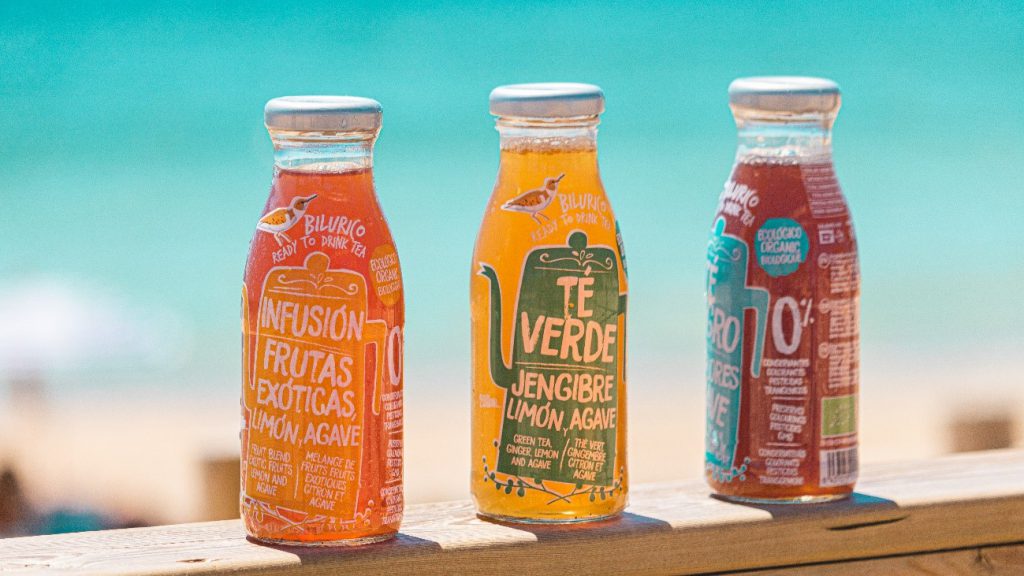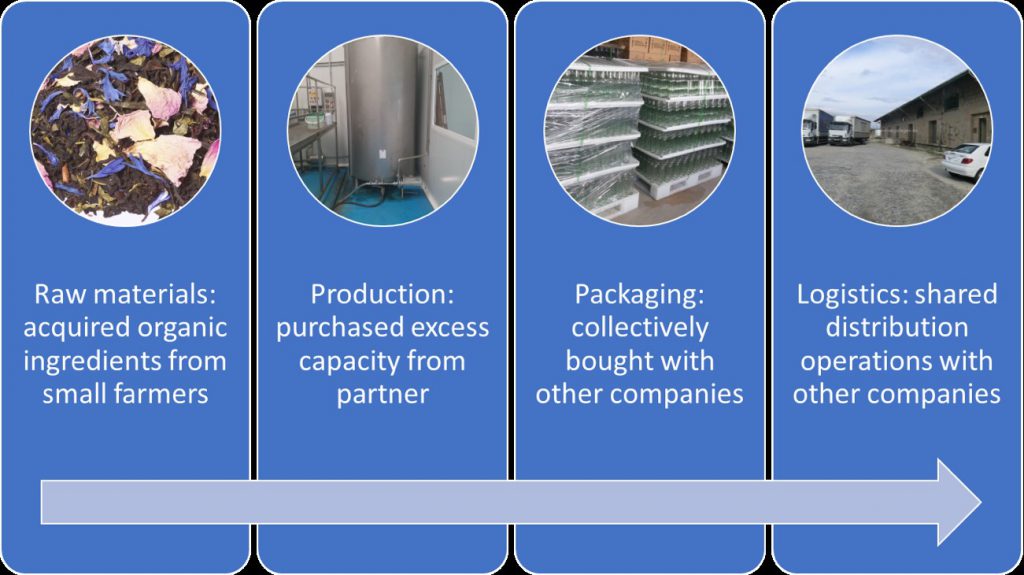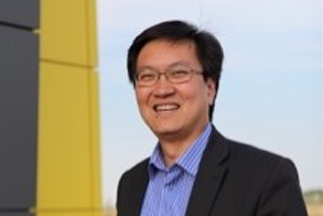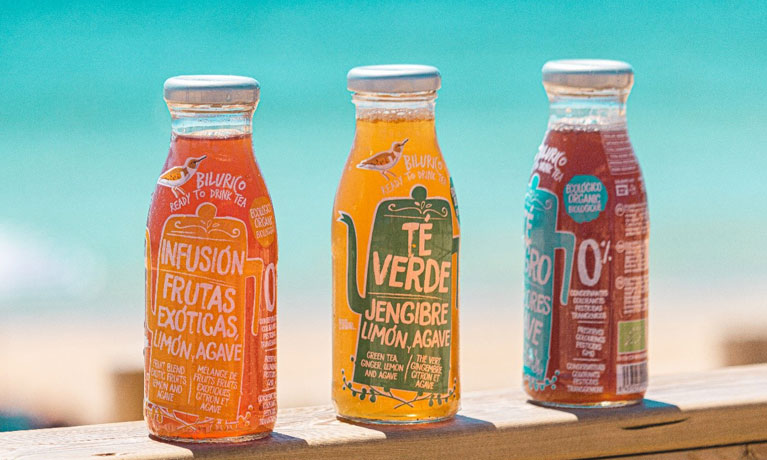By Prof Benny Tjahjono and Iago Radío Rodríguez
Bilurico is a small company located in Cambados, Galicia, north-west of Spain, producing organic and environmentally friendly beverages made of tea and fruit infusions. The company name is in honour of a small Galician coastal sandpiper bird (Actitis hypoleucos).
Although the organic food and beverage market in Spain is considerably small compared to that of other European countries, the Spanish market is proliferating. Bilurico saw the upwards trends in the market, particularly post the 2008 recession, along with the growth of Spanish upper middle class who are willing to pay more for organic food and beverage products.
Bilurico Ready to Drink Tea is available in three different options: 1) fruit blend, exotic fruits, lemon and agave; 2) green tea, ginger, lemon and agave; and 3) black tea, flower mix and agave.

Beverage production at Bilurico
Bilurico is an innovative company, operating a vertically integrated supply chain with its upstream suppliers and the downstream customers.

Raw materials
Bilurico only uses organic raw materials, free from chemical fertilisers, pesticides and genetically modified organisms (GMOs), that come with organic certification from an external body. The raw materials are mainly sourced from Spain and other EU to reduce the carbon footprint from transportation. The certificates also ensure the livelihood of the local farmers, good and fair labour condition, etc.
Production process
Beverage production is resource-intensive in terms of water, gas and electricity. Bilurico saw an innovative way of cost-saving and resource conservation at the same time, by “buying some excess production capacity” from another beverage company. This sharing economy model reduces the inefficiency from under-utilised assets and depreciation, in addition to optimising the use of water and energy. The effluent and residual waste rich in organic nutrients are turned into organic fertiliser, a reflection of the close-loop principle: “waste from one process becomes food for other processes”.
Packaging
To reduce waste and pollution from packaging, Bilurico uses glass bottles with recyclable caps and plastic labelling. Recycled glass is inherently cheaper than the brand-new ones due to the lower cost of raw materials. As the melting point of the recycled glass is lower than that of the virgin glass materials, processing recycled glass is also cheaper. Also, unlike plastics, the bottles from food and beverage can be directly reused for the same purpose.
Logistics, distribution and warehousing
Bilurico shares its logistic and distribution operations with other companies. Product storage is looked after by a partner who has extra capacity warehousing. Bilurico uses the third-party logistic (3PL) providers so it does not have to worry about optimising truck load and filling up the excess transport capacities.
Product Development and Marketing
Bilurico is small but innovative company emphasising on product development and marketing as the core competitiveness. Bilurico’s marketing effort is entirely online, making use of social media marketing that promotes sustainable competition. Sales outlets include retail, hospitality, vending and gyms.
Towards the Circular Economy
The Circular Economy (CE) upholds three main tenets: resource efficiency (minimise the consumption of finite resources and/or raw materials in the manufacture of products), maximisation of recirculation (aimed at keeping products at their highest utility and value) and waste prevention (minimising the contents that could end up in landfill or incineration).
Bilurico saw both economic and environmental benefits when choosing the CE business model, especially in sharing production, logistics and distributions operations with the partners.
The macro-economic benefits from CE are in the form of protecting businesses against scarcity of resources and volatile prices and creating new markets or business opportunities. In contrast, the micro-economic benefits include the reduction of costs increased production and improved energy conservation.
Bilurico lies on both macro and micro sides of the equations. The company saw these as a means of continuously being slim (lean) and competitive, and at the same time designed out any waste and pollution in all steps of their product’s life cycle.
Partnership for circularity
Bilurico is an exemplar of such a circular company. Its investment is not just for the planet; it also pays back in terms of macro and micro-economies due to the financial savings and the productivity increase, but most of all, new markets.
Bilurico’s business model depicts CE principles. The products are organic, against any use of chemicals that jeopardise the health and the environment. The supply chain, at the macro level, adopts the sharing economy model, by utilising each other’s excess capacity, hence upholding the principles of resource efficiency. The production processes promote efficiencies and waste prevention principles. The company makes the full use of residue from tea and fruits as organic fertiliser (waste to food).
Bilurico understands that working with the right partners, i.e. those who share the shared values and vision, is key to success. Though the partners also have similar production processes, they are in entirely different markets and different sales channels, so are not in direct competitions. Bilurico has proven that strong partnerships beyond commercial endeavours are where the future direction should lay.
Bilurico’s journey on an adventure towards the CE is not alone. Together with the Sustainable Production and Consumption (SPC) cluster at CBiS, Bilurico leverages on CE weaved into the customer value propositions. Both Bilurico and the SPC cluster are currently embarking on several new initiatives that leverage their strengths in research and innovation. These include food waste reduction in the supply chain, where together, they identify various scenarios for future organic tea.
Authors:

Benny Tjahjono is Professor of Sustainability and Supply Chain Management at CBIS. He has a vested interest in ensuring the achievement of the triple sustainability objectives, ‘doing good for people, planet and profit’. Much of his current work focuses on the roles of Circular Economy in supporting the achievement of the UN Sustainable Development goals. Email: benny.tjahjono@coventry.ac.uk

Iago Radío Rodríguez is founder and CEO of Bilurico Ready to Drink Tea. He received a bachelor degree in Engineering from the University of Vigo, Spain and an MSc in Engineering and Management of Manufacturing Systems from Cranfield University, UK. Email: hola@tesbilurico.es




Comments are disabled